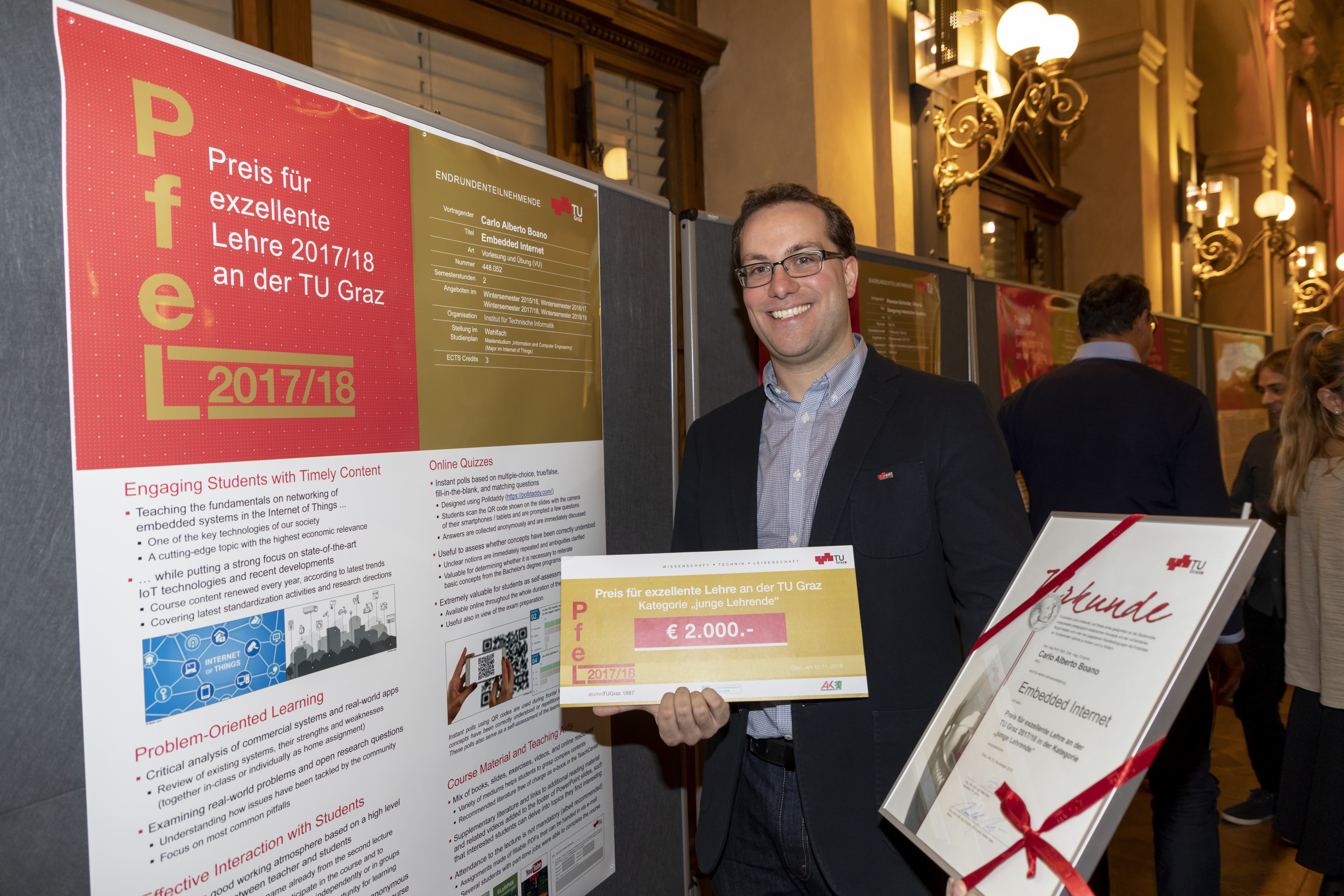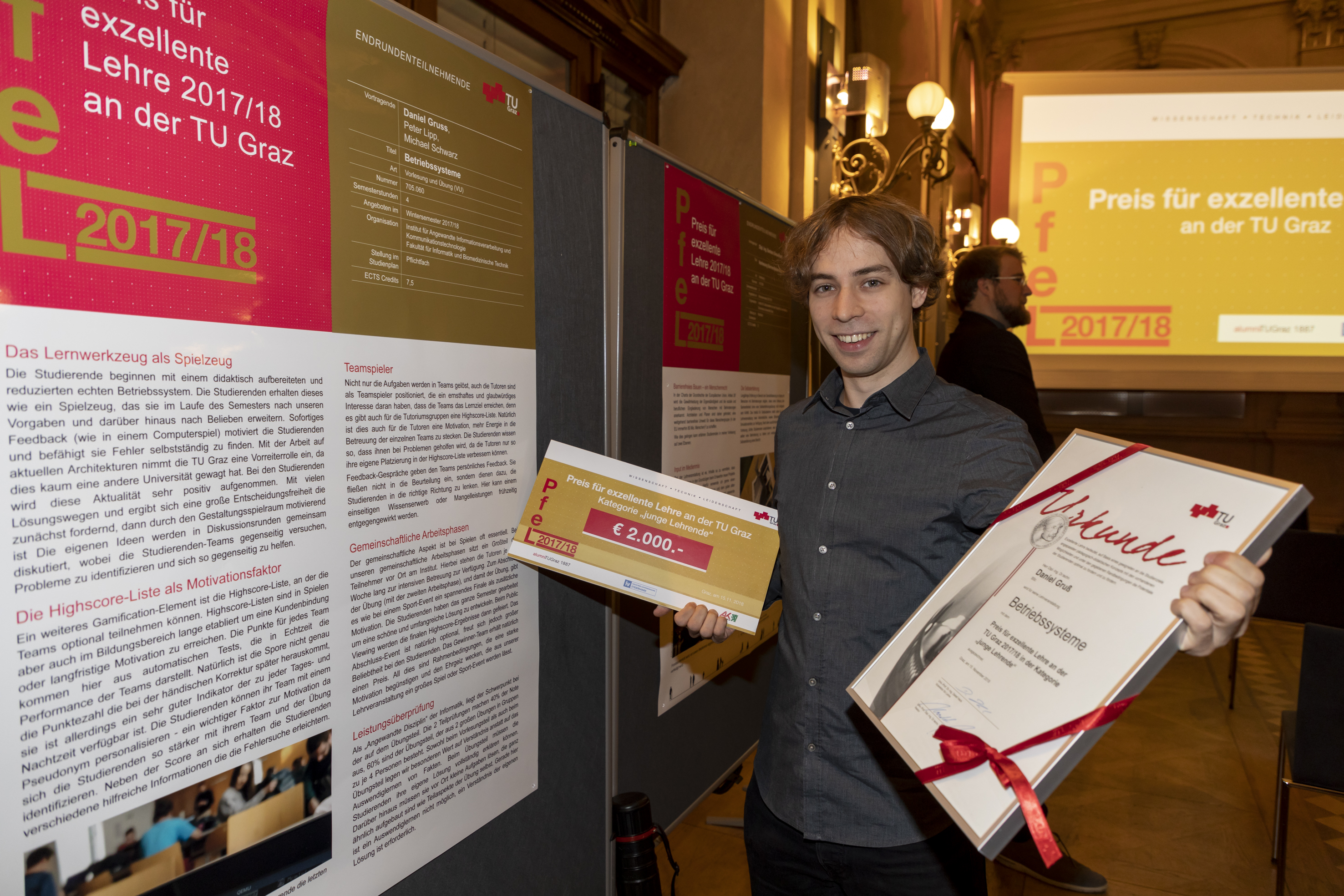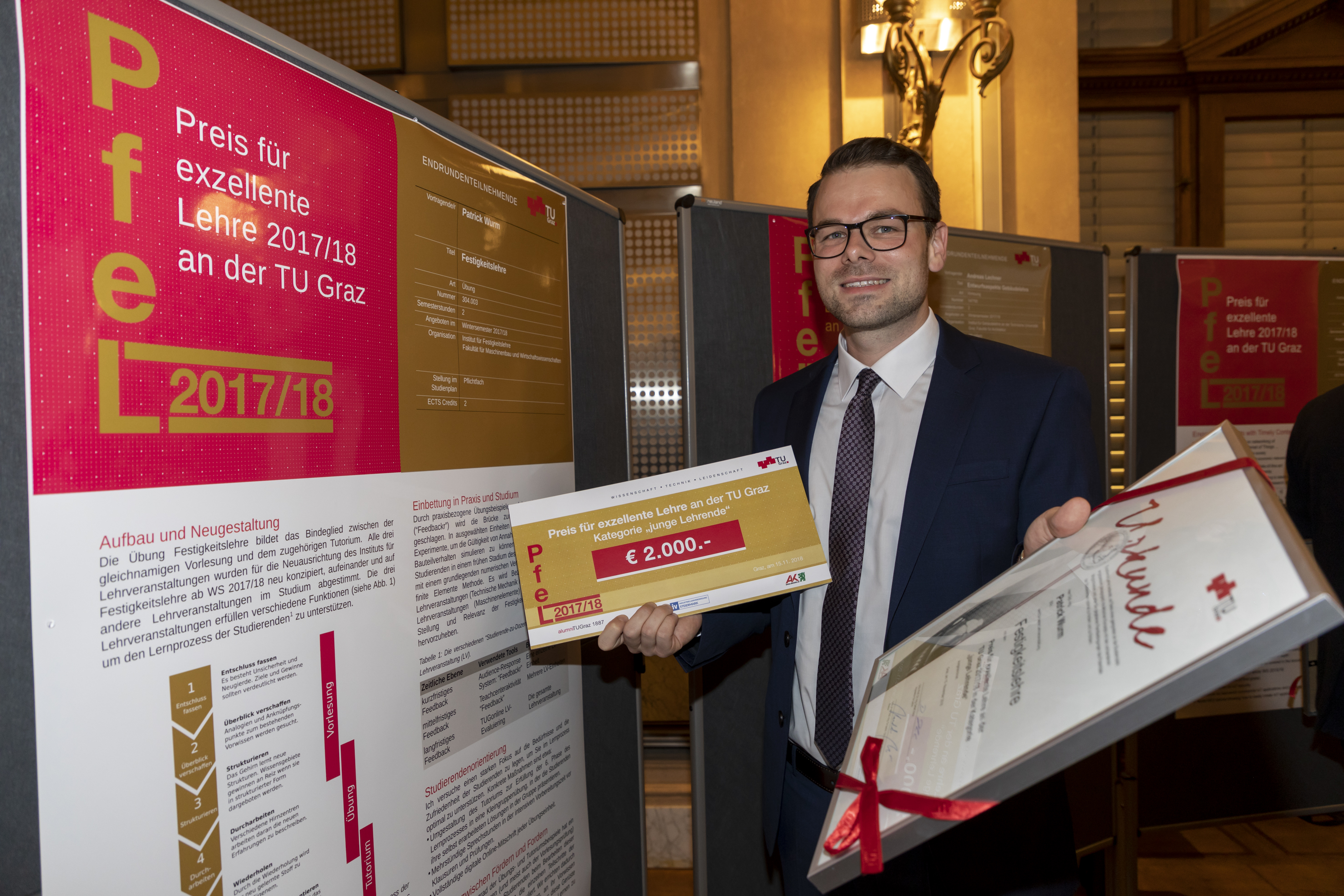Excellent teaching staff: TU Graz awards prizes to lecturers for outstanding performances in teaching
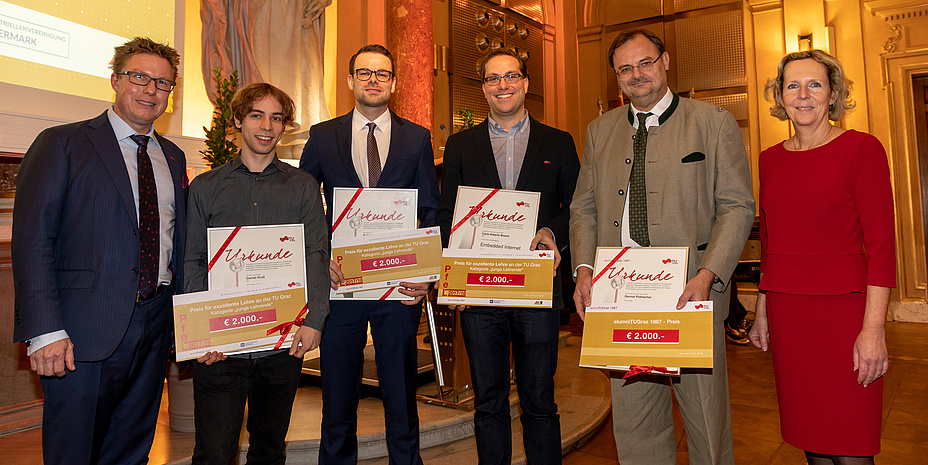
Every two years TU Graz recognises lecturers for outstanding pedagogic and didactic achievements. The Prize for Excellence in Teaching 2017/18 was given to Werner Lienhart from the Institute of Engineering Geodesy and Measurement Systems in the Great Hall on 15th November. In the category ‘Young Teacher’, two computer scientists – Carlo Alberto Boano and Daniel Gruss – as well as mechanical engineer Patrick Wurm picked up the prize. The prize money is 2000 euros per person. The alumniTUGraz 1887 special prize was awarded to physicist Gernot Pottlacher for his annual Christmas Lecture.
Innovative, practical and interactive: Excellent teachers do it differently
"We lecturers have to impart the feeling in a credible way that we have a personal interest in supporting their learning and shaping the learning process optimally," Patrick Wurm from the Institute of Strength of Materials states his personal credo. In addition to practical exercise examples and a good balance between nurturing and making demands, a culture of feedback plays a very important role in his ‘Strength of materials’ exercise class. With the help of the Feedbackr app he gets fast and simple feedback about the teaching contents from the more than 350 enrolled students. The students’ wishes and suggestions help him to plan his teaching and lead to a continual improvement of the course. Wurm also uses the app to give students regular feedback on how much they have achieved their clearly defined learning goals.
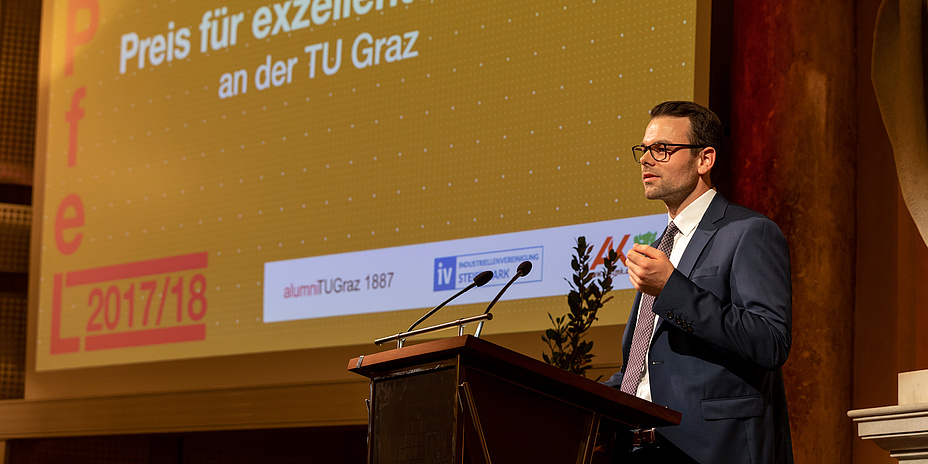
Patrick Wurm at the ceremony: "Students immediately notice whether someone is involved in teaching or not!
Daniel Gruss from the Institute of Applied Information Processing and Communication Technology supports students’ motivation in his course ‘Operating systems’ using gamification. "Students work with a didactically prepared, genuine operating system. During the semester they expand this ‘toy’ and develop something of which there are extremely proud." A high-score list also serves as a motivating factor. Changes to the operating system are depicted on the list at a moment’s notice. Students find out in real time how they compare to other students and colleagues. But it’s not only competition, esteem also substantially contributes to learning success: "As teachers we know how challenging our course is. We let them feel this by celebrating the best contributions with a big event at the end."
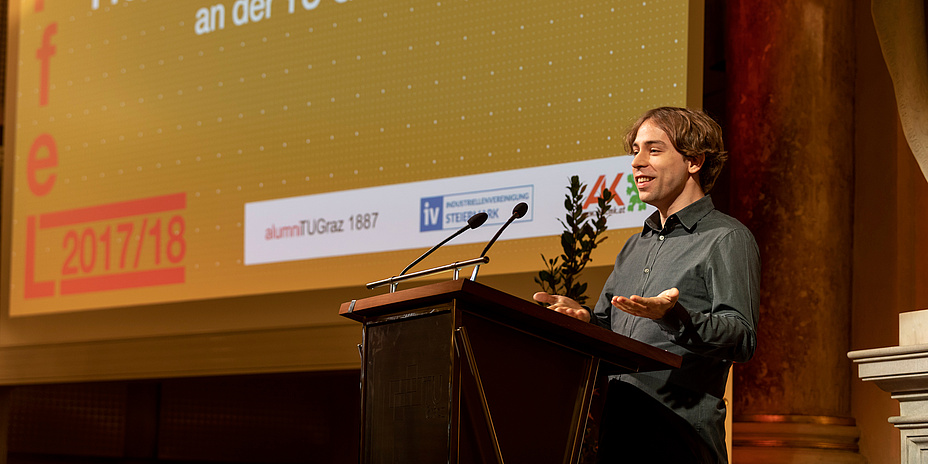
"Why do teenagers have difficulty memorizing English vocabulary when they can easily remember 150 Pokemon characters?" With Daniel Gruss, students learn with gamification.
Carlo Alberto Boano from the Institute for Technical Informatics inspires students in his ‘Embedded internet’ course with the latest applications for the Internet of Things (IoT) and has students face real problems from the various IoT application areas. For him, the appeal is to constantly adapt teaching content to the needs of the students and orientate himself to the current status of development of the IoT. QR codes are an interactive core element in his digital presentations. By means of these codes, students can take part in polls and test their knowledge during the class. Boano receives the answers anonymously in real time and can immediately assess whether the teaching content has been correctly understood or has to be repeated. In turn, students make use of the polls to make a personal assessment of the achievement of their learning goals.
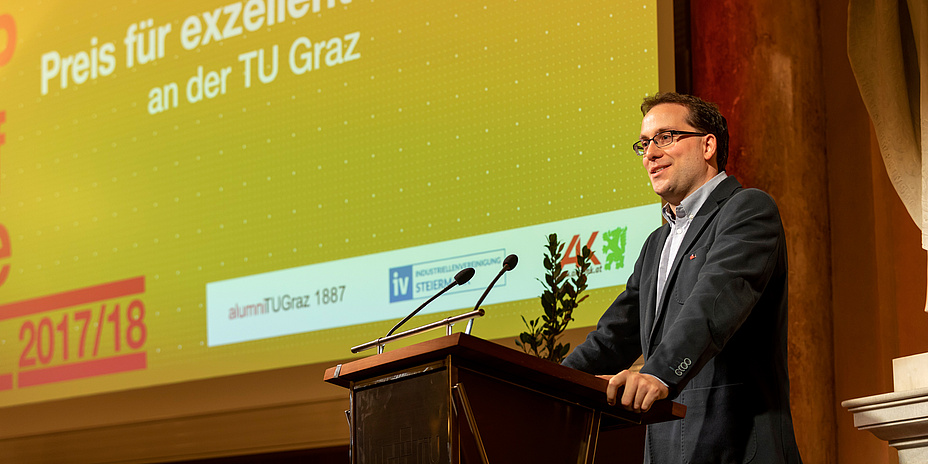
Carlo Alberto Boano gives his students insights into the future of the Internet of Things.
Werner Lienhart from the Institute of Engineering Geodesy and Measurement Systems focuses on directly integrating students in the progress of his
course ‘Advanced engineering geodesy’. In a mixture of talk, discussion and student draft, Lienhart and his students develop solutions for real projects in which Lienhart has actively participated. In addition, students get to know the solutions which were actually employed in the projects. With this comparison, Lienhart provides aha experiences to ensure that what has been learned will be remembered.
Gernot Pottlacher has achieved something extraordinary in his Christmas lecture. For many years, he has got students and the interested public – in equal measure – fascinated in experimental physics. He and his colleagues develop a new physics topic each year and fill the biggest lecture halls at TU Graz to the last seat. The 2018 Christmas lecture will take the form of an experimental journey through the phase diagram and will take place at 4pm on 12th December.
Appreciation and reward for commitment
‘TU Graz lives from our committed teaching staff. With the Prize for Excellence in Teaching we want to reward them, honour best practice teaching concepts with a curtain call, and show the high quality that university teaching staff have,’ says Detlef Heck, TU Graz’s Vice Rector for Academic Affairs. He is delighted that ‘this year, three young academics have won prizes. The young generation of researchers also enjoy teaching and this is echoed in their creative and practical teaching concepts which were recognised yesterday with prizes’.
Complicated selection procedure: How the prizewinners are chosen
The awards ceremony comes after an exhaustive selection procedure. Students, deans of studies and lecturers can themselves nominate courses which have taken place in the last three academic years or which are offered in the semester in which they were nominated, providing they have been evaluated by at least five students. Nominees have to submit a description of the course and a concept with pedagogic and didactic backgrounds. These documents serve as a basis for the decision. Other criteria, such as teaching methods and teaching goals, the quality of the teaching material as well as organisation and adherence to deadlines are also taken into account in the assessment. The final decision about the prizewinners is made by a selection committee chaired by the Vice Rector for Academic Affairs, consisting of representatives of the Students’ Union, University Council, curricular committees, the Senate and external experts on the topic of university teaching. The successful academics are nominated for the Ars docendi State Prize for Excellence in Teaching at public universities in Austria.
Kontakt
Gerald GABERSCIK
Dipl.-Ing. Dr.techn.
Quality Management
Tel.: +43 (0) 316 873 6019
E-Mail: gerald.gaberscik@tugraz.at



